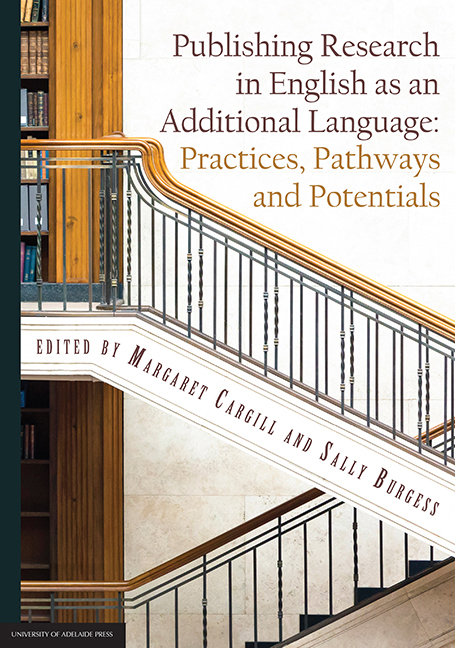Book contents
- Frontmatter
- Contents
- List of contributors
- Acknowledgements
- Foreword
- Introduction: Unpacking English for Research Publication Purposes [ERPP] and the intersecting roles of those who research, teach and edit it
- 1 Accept or contest: A life-history study of humanities scholars’ responses to research publication policies in Spain
- 2 Introducing research rigour in the social sciences: Transcultural strategies for teaching ERPP writing, research design, and resistance to epistemic erasure
- 3 Blurring the boundaries: Academic advising, authors’ editing and translation in a graduate degree program
- 4 The delicate art of commenting: Exploring different approaches to editing and their implications for the author-editor relationship
- 5 The CCC Model (Correspondence, Consistency, Correctness): How effective is it in enabling and assessing change in text-editing knowledge and skills in a blended-learning postgraduate course?
- 6 How credible are open access emerging journals? A situational analysis in the humanities
- 7 Disseminating research internationally: Intra-subdisciplinary rhetorical structure variation in immunity and allergy research articles
- 8 Scientists publishing research in English from Indonesia: Analysing outcomes of a training intervention to inform institutional action
- 9 ‘The one who is out of the ordinary shall win’: Research supervision towards publication in a Chinese hospital
- 10 The geopolitics of academic plagiarism
- 11 Training ‘clerks of the [global] empire’ for 21st-century Asia? English for Research Purposes (ERP) in Vietnam
- 12 Standardisation and its discontents
- Reflections and future directions in publishing research in English as an Additional Language: An afterword
Reflections and future directions in publishing research in English as an Additional Language: An afterword
Published online by Cambridge University Press: 16 March 2018
- Frontmatter
- Contents
- List of contributors
- Acknowledgements
- Foreword
- Introduction: Unpacking English for Research Publication Purposes [ERPP] and the intersecting roles of those who research, teach and edit it
- 1 Accept or contest: A life-history study of humanities scholars’ responses to research publication policies in Spain
- 2 Introducing research rigour in the social sciences: Transcultural strategies for teaching ERPP writing, research design, and resistance to epistemic erasure
- 3 Blurring the boundaries: Academic advising, authors’ editing and translation in a graduate degree program
- 4 The delicate art of commenting: Exploring different approaches to editing and their implications for the author-editor relationship
- 5 The CCC Model (Correspondence, Consistency, Correctness): How effective is it in enabling and assessing change in text-editing knowledge and skills in a blended-learning postgraduate course?
- 6 How credible are open access emerging journals? A situational analysis in the humanities
- 7 Disseminating research internationally: Intra-subdisciplinary rhetorical structure variation in immunity and allergy research articles
- 8 Scientists publishing research in English from Indonesia: Analysing outcomes of a training intervention to inform institutional action
- 9 ‘The one who is out of the ordinary shall win’: Research supervision towards publication in a Chinese hospital
- 10 The geopolitics of academic plagiarism
- 11 Training ‘clerks of the [global] empire’ for 21st-century Asia? English for Research Purposes (ERP) in Vietnam
- 12 Standardisation and its discontents
- Reflections and future directions in publishing research in English as an Additional Language: An afterword
Summary
Academia has become a world in which scholars are being encouraged or pressured to publish more articles in higher-impact journals under increasingly stringent evaluation and review systems. In the UK, for example, the assessment of scholars’ research outputs within the national Research Excellence Framework [REF] can affect individuals’ promotions, departmental funding, and ultimately the ranking of the university within the country (Higher Education Funding Council for England, 2009; Parker, 2008; Martin, 2011). In countries where English is seen as an additional language, the pressures on scholars can be even greater. Not only do they have to reach the high standards of international journals in terms of content, relevance and novelty, but they also have to meet the often opaque and varying language requirements of these journals, while navigating through the sometimes cryptic, indirect suggestions and comments of reviewers (Paltridge, 2015).
It is within this demanding and challenging environment that the PRISEAL [Publishing and Presenting Research Internationally: Issues for Speakers of English as an Additional Language] and MET [Mediterranean Editors and Translators] organisations decided to hold a joint conference in 2015. The conference was held in the beautiful city of Coimbra, Portugal, and provided a unique forum for researchers on academic writing and research publication to meet with in-house and freelance professional editors, who receive daily requests from clients to edit or translate their work for publication. In this volume that emerged from the joint conference, we can see a strong reiteration of the growing pressure on scholars to publish in English and recognition of the challenges they face. However, the strongest message we can receive from the authors of these chapters is that the challenges faced by scholars using English as an additional language can be overcome through a greater understanding of the problems they face, instruction and supervision from academic faculty that is tailored to their particular needs and contexts, and discipline-specific, focused support from professional language editors and translation experts.
- Type
- Chapter
- Information
- Publishing Research in English as an Additional LanguagePractices, Pathways and Potentials, pp. 255 - 258Publisher: The University of Adelaide PressPrint publication year: 2017



